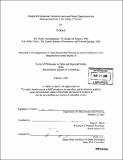| dc.contributor.advisor | Diane E. Davis. | en_US |
| dc.contributor.author | Raich, Uri | en_US |
| dc.contributor.other | Massachusetts Institute of Technology. Dept. of Urban Studies and Planning. | en_US |
| dc.coverage.spatial | n-mx--- | en_US |
| dc.date.accessioned | 2007-11-15T19:49:03Z | |
| dc.date.available | 2007-11-15T19:49:03Z | |
| dc.date.copyright | 2006 | en_US |
| dc.date.issued | 2006 | en_US |
| dc.identifier.uri | http://dspace.mit.edu/handle/1721.1/34407 | en_US |
| dc.identifier.uri | http://hdl.handle.net/1721.1/34407 | |
| dc.description | Thesis (Ph. D.)--Massachusetts Institute of Technology, Dept. of Urban Studies and Planning, 2006. | en_US |
| dc.description | Page 264 blank. | en_US |
| dc.description | Includes bibliographical references (p. 247-255). | en_US |
| dc.description.abstract | This study is about the impact of decentralization in metropolitan areas. Studies of fiscal decentralization have largely centered on the formal tiers of government, without looking at the effects of this process on the recipient jurisdictions in metropolitan areas. This is an important omission, considering that more than 50 percent of the world's population lives in urban areas that often extend beyond formal jurisdictional boundaries. As a response, in this study I incorporate the metropolitan dimension into the study of fiscal decentralization. After integrating a database with information on the public finances of the Metropolitan Zone of the Valley of Mexico (ZMVM), I test the hypothesis that the policies of fiscal decentralization in Mexico have exacerbated the level of fiscal disparity in this metropolitan area. My results show that fiscal disparity in the ZMVM increased during the 1990s. Fiscal decentralization had two different and opposite effects on fiscal disparities in the ZMVM. On one hand, fiscal decentralization mitigated fiscal disparities through the use of a system of redistributive transfers. On the other, and in contrast to this equalizing effect, decentralization has exacerbated the level of fiscal disparity by accentuating the differences of the jurisdictions' expenditure needs and their capacity to collect local taxes. | en_US |
| dc.description.abstract | (cont.) In particular, this research shows that despite state intervention through a system of redistributive transfers, the increase in fiscal disparities was due to three primary factors: the indirect effect of transfers on local fiscal effort, the uneven distribution of services and infrastructure in the metropolitan space, and differing governance structures in the ZMVM's jurisdictions. Due to the negative effects of fiscal disparities on urban segregation and poverty, I recommend two policy alternatives to mitigate fiscal fragmentation in the ZMVM: the creation of a metropolitan fund and the formation of a special authority for the transportation sector. | en_US |
| dc.description.statementofresponsibility | by Uri Raich. | en_US |
| dc.format.extent | 264 p. | en_US |
| dc.language.iso | eng | en_US |
| dc.publisher | Massachusetts Institute of Technology | en_US |
| dc.rights | M.I.T. theses are protected by copyright. They may be viewed from this source for any purpose, but reproduction or distribution in any format is prohibited without written permission. See provided URL for inquiries about permission. | en_US |
| dc.rights.uri | http://dspace.mit.edu/handle/1721.1/34407 | en_US |
| dc.rights.uri | http://dspace.mit.edu/handle/1721.1/7582 | |
| dc.subject | Urban Studies and Planning. | en_US |
| dc.title | Unequal development : decentralization and fiscal disparities in the Metropolitan Zone of the Valley of Mexico | en_US |
| dc.title.alternative | Decentralization and fiscal disparities in the Metropolitan Zone of the Valley of Mexico | en_US |
| dc.type | Thesis | en_US |
| dc.description.degree | Ph.D. | en_US |
| dc.contributor.department | Massachusetts Institute of Technology. Department of Urban Studies and Planning | |
| dc.identifier.oclc | 70252975 | en_US |
